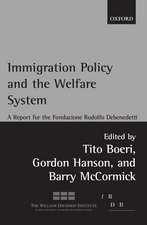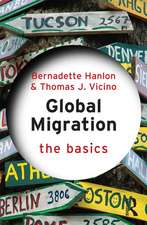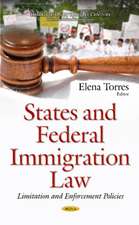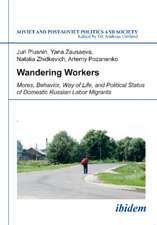Intimate Migrations – Gender, Family, and Illegality among Transnational Mexicans
Autor Deborah A. Boehmen Limba Engleză Paperback – 30 iun 2013
| Toate formatele și edițiile | Preț | Express |
|---|---|---|
| Paperback (1) | 207.82 lei 6-8 săpt. | |
| MI – New York University – 30 iun 2013 | 207.82 lei 6-8 săpt. | |
| Hardback (1) | 523.05 lei 6-8 săpt. | |
| MI – New York University – 22 apr 2012 | 523.05 lei 6-8 săpt. |
Preț: 207.82 lei
Nou
Puncte Express: 312
Preț estimativ în valută:
39.77€ • 41.60$ • 33.03£
39.77€ • 41.60$ • 33.03£
Carte tipărită la comandă
Livrare economică 02-16 aprilie
Preluare comenzi: 021 569.72.76
Specificații
ISBN-13: 9781479885558
ISBN-10: 147988555X
Pagini: 188
Dimensiuni: 152 x 228 x 12 mm
Greutate: 0.27 kg
Editura: MI – New York University
ISBN-10: 147988555X
Pagini: 188
Dimensiuni: 152 x 228 x 12 mm
Greutate: 0.27 kg
Editura: MI – New York University
Recenzii
"With an ethnographers eye for detail, Boehm shows us the hopes, dreams, frustrations, tensions, divisions, and enduring qualities of lives among families connected and split by the U.S.-Mexico border. Intimate Migrations puts a human face on the reasons why people migrate, changing gender relations, and how children experience these dynamic and fluid processes, all of which are subject to increasingly restrictionist U.S. immigration laws. . . . A must read for anyone interested in understanding our complex, transnational world." -Leo Chavez,University of California, Irvine
"Deborah Boehms Intimate Migrations begins and ends with stories of transnational Mexican families that highlight the intersection of intimacy and illegality in deeply personal ways.... This evocative ethnography is based on 13 years of transnational fieldwork among familial networks stretching between states in the US West and Southwest and the Mexican states of Zacatecas and San Luis Potosí. While contributing to the growing literature on everyday lived experiences of transnationalism, the book advances the study of the state, intimate interactions and transnational migration." - Social Anthropology/Anthropologie Sociale, May 2013
"Intimate Migrations explores the human side of immigration, vividly portraying everyday lives on both sides of the U.S./Mexican border. Drawing on interviews and field work in Albuquerque and the small rancho of San Marcos in San Luis Potosi, Boehm outlines the sharp differences between male and female migration. Young men follow in the footsteps of their fathers, brothers, and uncles and migrate to become adults and providers, while women and children remain in the rancho or migrate much later, often to care for households of male kin rather than to enter the work force. These gender differences are in turn shaped by the potency and reach of U.S. Policy that constructs `illegal and `legal persons, constrains movement, conveys citizenship, and allows for family reunification- policies that fall unevenly on kin networks…. A moving panorama of how these contradictions play out in personal lives."--Louise Lamphere,University of New Mexico"Recommended for all levels/libraries."-CHOICE
"Deborah Boehms Intimate Migrations begins and ends with stories of transnational Mexican families that highlight the intersection of intimacy and illegality in deeply personal ways.... This evocative ethnography is based on 13 years of transnational fieldwork among familial networks stretching between states in the US West and Southwest and the Mexican states of Zacatecas and San Luis Potosí. While contributing to the growing literature on everyday lived experiences of transnationalism, the book advances the study of the state, intimate interactions and transnational migration." - Social Anthropology/Anthropologie Sociale, May 2013
"Intimate Migrations explores the human side of immigration, vividly portraying everyday lives on both sides of the U.S./Mexican border. Drawing on interviews and field work in Albuquerque and the small rancho of San Marcos in San Luis Potosi, Boehm outlines the sharp differences between male and female migration. Young men follow in the footsteps of their fathers, brothers, and uncles and migrate to become adults and providers, while women and children remain in the rancho or migrate much later, often to care for households of male kin rather than to enter the work force. These gender differences are in turn shaped by the potency and reach of U.S. Policy that constructs `illegal and `legal persons, constrains movement, conveys citizenship, and allows for family reunification- policies that fall unevenly on kin networks…. A moving panorama of how these contradictions play out in personal lives."--Louise Lamphere,University of New Mexico"Recommended for all levels/libraries."-CHOICE
Notă biografică
Descriere
Sheds new light on the study of gender and kinship, as well as understandings of the state and transnational migration.


















